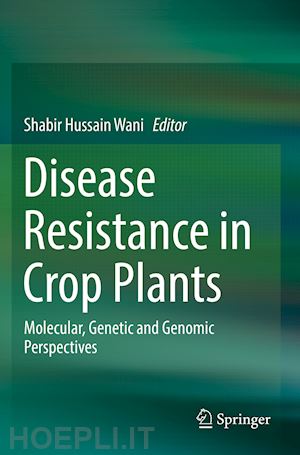
Questo prodotto usufruisce delle SPEDIZIONI GRATIS
selezionando l'opzione Corriere Veloce in fase di ordine.
Pagabile anche con Carta della cultura giovani e del merito, 18App Bonus Cultura e Carta del Docente
Human population is escalating at an enormous pace and is estimated to reach 9.7 billion by 2050. As a result, there will be an increase in demand for agricultural production by 60–110% between the years 2005 and 2050 at the global level; the number will be even more drastic in the developing world. Pathogens, animals, and weeds are altogether responsible for between 20 to 40 % of global agricultural productivity decrease. As such, managing disease development in plants continues to be a major strategy to ensure adequate food supply for the world. Accordingly, both the public and private sectors are moving to harness the tools and paradigms that promise resistance against pests and diseases. While the next generation of disease resistance research is progressing, maximum disease resistance traits are expected to be polygenic in nature and controlled by selective genes positioned at putative quantitative trait loci (QTLs). It has also been realized that sources of resistance are generally found in wild relatives or cultivars of lesser agronomic significance. However, introgression of disease resistance traits into commercial crop varieties typically involves many generations of backcrossing to transmit a promising genotype. Molecular marker-assisted breeding (MAB) has been found to facilitate the pre-selection of traits even prior to their expression. To date, researchers have utilized disease resistance genes (R-genes) in different crops including cereals, pulses, and oilseeds and other economically important plants, to improve productivity. Interestingly, comparison of different R genes that empower plants to resist an array of pathogens has led to the realization that the proteins encoded by these genes have numerous features in common. The above observation therefore suggests that plants may have co-evolved signal transduction pathways to adopt resistance against a wide range of divergent pathogens. A better understanding of the molecular mechanisms necessary for pathogen identification and a thorough dissection of the cellular responses to biotic stresses will certainly open new vistas for sustainable crop disease management. This book summarizes the recent advances in molecular and genetic techniques that have been successfully applied to impart disease resistance for plants and crops. It integrates the contributions from plant scientists targeting disease resistance mechanisms using molecular, genetic, and genomic approaches. This collection therefore serves as a reference source for scientists, academicians and post graduate students interested in or are actively engaged in dissecting disease resistance in plants using advanced genetic tools.
Foreword
1. Biotic and abiotic stresses, impact on plants and their response
2. Cloning of genes underlying quantitative resistance for plant disease control
3. CRISPR based tools for crop improvement: Understanding the plant pathogen interaction
4. Disease resistance in wheat: present status and future prospects
5. Rice, Marker-assisted breeding and Disease Resistance
6. Genome Wide Association Study (GWAS) on Disease Resistance in Maize
7. Molecular breeding approaches for disease resistance in sugarcane
8. Molecular breeding for resistance to economically important diseases of Pulses
9. Molecular Breeding for Resistance to Economically Important Diseases of Fodder Oat
10. Charcoal rot resistance in soybean-current understanding and future perspectives
11. Barley, Disease Resistance, and Molecular breeding approaches
Index











Il sito utilizza cookie ed altri strumenti di tracciamento che raccolgono informazioni dal dispositivo dell’utente. Oltre ai cookie tecnici ed analitici aggregati, strettamente necessari per il funzionamento di questo sito web, previo consenso dell’utente possono essere installati cookie di profilazione e marketing e cookie dei social media. Cliccando su “Accetto tutti i cookie” saranno attivate tutte le categorie di cookie. Per accettare solo deterninate categorie di cookie, cliccare invece su “Impostazioni cookie”. Chiudendo il banner o continuando a navigare saranno installati solo cookie tecnici. Per maggiori dettagli, consultare la Cookie Policy.